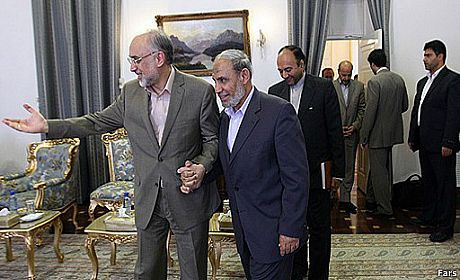Disappointed with Egypt, Optimistic on Iran

Notwithstanding the propaganda war launched by Western media with regard to the differences between Iran and Hamas, Mahmood Alzahar visited Tehran. What is your assessment of the overt and covert objectives of this visit?
In my opinion, Iran, as a country which leads the axis of resistance in the region, is naturally very important for Hamas, and Mahmood Alzahar's visit is related to the strengthening of relations between Iran and Hamas. Of course, it seems that, prior to recent events, Hamas assumed that the victory of the awakening revolutions in the region and the coming to power of the Muslim Brotherhood in these countries, particularly in Egypt and Tunisia, would create new support for Hamas in its struggles against the Zionist Regime. But, in practice, such a demand was not met and the type of relations created between Egypt and the government of resistance in Gaza and other groups of resistance in Palestine has not met their expectations. Considering the fact that Mahmood Alzahar is one of the prominent personalities of Hamas who emphasizes resistance, it seems that his visit, while leading a delegation, was a positive step towards the deepening of relations between Iran and the Islamic Resistance Movement in Palestine.
In the NAM Summit, it was first said that Ismaeil Hanieh, the Prime Minister of the Hamas government, was invited but Iran denied such a claim. What impacts, in your opinion, might this issue have on relations between Tehran and Hamas?
Heads of state participate in NAM summits and, based on the political structure in Palestine, Mahmood Abbas is the head of the Palestinian Authority, particularly because the present system in Palestine is a presidential one (like Iran and the US). It means that the first person responsible for Palestine, based on the accepted structures in the international system, is Mahmood Abbas. Therefore, it is totally natural that Iran, based on protocol, should have invited the head of this country and this issue has had no relation with Iran or other NAM member countries' political positions. Iran, as the president of this summit, was obliged, despite its relations with any of these countries, to invite their highest political figures; hence, inviting Mahmood Abbas had nothing to do with Iran's relations with Hamas or the government of Hamas in Gaza. The reason is that there is a protocol based upon which Iran has acted. In my opinion, Hamas and the government of Hanieh did not have any expectations from Iran in this regard to participate in the Summit instead of Mahmood Abbas.
Some Western and Arabic media outlets consider the issue of Syria as an element to create differences between Iran and Hamas. How do you evaluate the positions of both sides with regard to the Syrian crisis and what is its impact on bilateral relations?
The axis of resistance is a joint entity. In other words, as Iran considers itself responsible for Palestine and resistance in Lebanon, the same feeling of responsibility exists in other parts of the resistance with regard to other members of the resistance or such a feeling must exist. Iran believes that today Syria is attacked because of the positions that it has taken in support of the resistance especially the issue of Palestine. Therefore, at a time when this conspiracy is being waged against Syria, Iran expects Hamas to compensate costs Syria has endured and to support this country because Syria is being attacked due to its support for the resistance. Unfortunately, due to different reasons including those related to the fact that Hamas is under pressure from the Muslim Brotherhood and some public opinion within Palestine to change its position regarding Syria; it has differences of opinion with Iran. Nevertheless, Hamas has refrained from taking negative positions against Syria and has tried to take a neutral stance in this regard. However, this position has not satisfied other members of the resistance block, meaning Syria and Hezbollah, and has naturally caused a sort of disappointment in Iran-Hamas relations. Neither has Hamas surely left the resistance axis nor has Iran’s view on support for Hamas and the resistance changed. At any rate, it seems that Hamas tries to pass this situation and give new breath to its relation with Iran thus warming it up once more.
How do you evaluate relations between Hamas and the new Egyptian government which has come from the Muslim Brotherhood?
It is natural that one of the most important causes, roots and objectives of the Egyptian revolution was Egypt’s position regarding Palestine, particularly Gaza. The Egyptian people expect their government’s policies on Palestine particularly Gaza and its blockade and provision of assistance to its people to change. Palestinians expect this to happen too. Unfortunately, what we are seemingly witnessing is that, at the moment, Egypt’s foreign policy has not dramatically changed and the game’s regulations are applied on the basis of those designed during Mubarak’s era. Small changes including the opening of the Rafah passageway, intended for the movement of Palestinians, have taken place. However, Palestinians do not only need to have this movement. The resistance needs to have the support responsive to Palestinians’ aspirations and those of the Islamic world concerning the liberation of Quds. Unfortunately, this has not been materialized and, in contrast to what the Mubarak regime was not able to do, meaning the destruction of underground tunnels between Egypt and Gaza, is being done by the Morsi government. These tunnels were the main passages for securing needed tools of the resistance to confront the Zionist regime’s aggressions. Therefore, the demands of the people of Egypt, Hamas and Palestinians have not been naturally responded to. Egypt and Hamas have politically gotten closer to each other. However, this cannot be construed as a fundamental change expected from a revolutionary Egypt.

